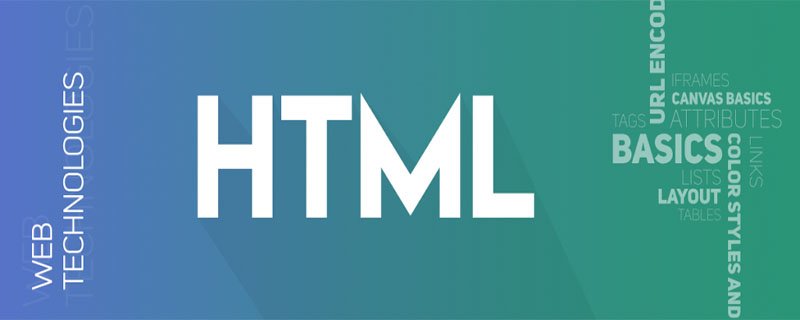How to clear html page cache

When the page is opened, the newly updated data sometimes cannot be refreshed in time due to the existence of cache. The problem is more obvious when the page is opened as a modal window.
(Recommended tutorial: html tutorial)
So how should we solve this problem?
The solution is:
(1) Use HTML tags to set HTTP header information
<HEAD> <METAHTTP-EQUIV="Pragma"CONTENT="no-cache"> <METAHTTP-EQUIV="Cache-Control"CONTENT="no-cache"> <METAHTTP-EQUIV="Expires"CONTENT="0"> </HEAD>
Explanation: HTTP header information "Expires" and "Cache-Control" are applications The server provides a mechanism to control caching on browsers and proxy servers. The HTTP header Expires tells the proxy server when its cached page will expire. The newly defined header information Cache-Control in the HTTP1.1 specification can inform the browser not to cache any pages. When the back button is clicked, the browser revisits the server to obtain the page. The following is the basic method of using Cache-Control:
(Learning video recommendation: html video tutorial)
1. no-cache: Force the cache to obtain new data from the server Page
2. no-store: The cache does not save any page in any environment
Pragma: no-cache in the HTTP1.0 specification is equivalent to Cache- in the HTTP1.1 specification Control:no-cache can also be included in the header information.
(2) Add a random parameter after the url that needs to be opened:
Before adding parameters: url=test/test.jsp
After adding parameters: url= test/test.jsp?ranparam=random()
Explanation: Because the parameters behind the URL of each request are different, it is equivalent to requesting a different page. Use this method to save the country and clear the cache. .
The above is the detailed content of How to clear html page cache. For more information, please follow other related articles on the PHP Chinese website!

Hot AI Tools

Undresser.AI Undress
AI-powered app for creating realistic nude photos

AI Clothes Remover
Online AI tool for removing clothes from photos.

Undress AI Tool
Undress images for free

Clothoff.io
AI clothes remover

AI Hentai Generator
Generate AI Hentai for free.

Hot Article

Hot Tools

Notepad++7.3.1
Easy-to-use and free code editor

SublimeText3 Chinese version
Chinese version, very easy to use

Zend Studio 13.0.1
Powerful PHP integrated development environment

Dreamweaver CS6
Visual web development tools

SublimeText3 Mac version
God-level code editing software (SublimeText3)

Hot Topics
 Table Border in HTML
Sep 04, 2024 pm 04:49 PM
Table Border in HTML
Sep 04, 2024 pm 04:49 PM
Guide to Table Border in HTML. Here we discuss multiple ways for defining table-border with examples of the Table Border in HTML.
 Nested Table in HTML
Sep 04, 2024 pm 04:49 PM
Nested Table in HTML
Sep 04, 2024 pm 04:49 PM
This is a guide to Nested Table in HTML. Here we discuss how to create a table within the table along with the respective examples.
 HTML margin-left
Sep 04, 2024 pm 04:48 PM
HTML margin-left
Sep 04, 2024 pm 04:48 PM
Guide to HTML margin-left. Here we discuss a brief overview on HTML margin-left and its Examples along with its Code Implementation.
 HTML Table Layout
Sep 04, 2024 pm 04:54 PM
HTML Table Layout
Sep 04, 2024 pm 04:54 PM
Guide to HTML Table Layout. Here we discuss the Values of HTML Table Layout along with the examples and outputs n detail.
 How do you parse and process HTML/XML in PHP?
Feb 07, 2025 am 11:57 AM
How do you parse and process HTML/XML in PHP?
Feb 07, 2025 am 11:57 AM
This tutorial demonstrates how to efficiently process XML documents using PHP. XML (eXtensible Markup Language) is a versatile text-based markup language designed for both human readability and machine parsing. It's commonly used for data storage an
 Moving Text in HTML
Sep 04, 2024 pm 04:45 PM
Moving Text in HTML
Sep 04, 2024 pm 04:45 PM
Guide to Moving Text in HTML. Here we discuss an introduction, how marquee tag work with syntax and examples to implement.
 HTML Ordered List
Sep 04, 2024 pm 04:43 PM
HTML Ordered List
Sep 04, 2024 pm 04:43 PM
Guide to the HTML Ordered List. Here we also discuss introduction of HTML Ordered list and types along with their example respectively
 HTML onclick Button
Sep 04, 2024 pm 04:49 PM
HTML onclick Button
Sep 04, 2024 pm 04:49 PM
Guide to HTML onclick Button. Here we discuss their introduction, working, examples and onclick Event in various events respectively.






